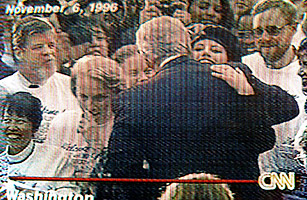
Monica Lewinsky began her White House internship in July 1995
SPRING 1995
Monica Lewinsky graduates from Lewis and Clark College, and heads to Washington, D.C. for an unpaid internship at the White House.
NOVEMBER 1995
President Clinton and Lewinsky begin a series of sexual encounters at the White House.
APRIL 1996
Lewinsky leaves the White House for public affairs post at the Pentagon.
DECEMBER 1997
Lewinksy friend Linda Tripp tells the former intern that she won't shield their conversations if questioned during depositions with attorneys for Paula Jones.
JANUARY 12, 1998
Linda Tripp contacts Independent counsel Kenneth Starr's office, providing 20 hours of taped conversations with Lewinsky. The next day, Tripp wears an FBI body microphone during a meeting with Lewinsky at the Ritz-Carlton Hotel in Pen tagon City, Virginia, and records their conversation.
JANUARY 16, 1998
Attorney General Jane Reno approves an expansion of Starr's probe into the Lewinsky matter.
JANUARY 17, 1998
President Clinton, testifying under oath to lawyers in the Paula Jones sexual harassment case, denies having had an affair with Lewinsky.
JANUARY 26, 1998
At a White House event, Clinton states, "I did not have sexual relations with that woman. ... I never told anybody to lie." "These allegations are false."
JANUARY 27, 1998
Kenneth Starr opens a grand jury probe into Monica Lewinsky's allegations. Hillary Clinton, appearing on NBC's "Today" show, says the controversy has been fabricated by a "vast right-wing conspiracy."
APRIL 24, 1998
In five hours of videotaped testimony, Starr questions Hillary Clinton at the White House about her legal work for the failed Madison Guaranty Savings and Loan during the 1980s.
JUNE 2, 1998
Lewinsky replaces her attorney, William Ginsburg, with two seasoned Washington attorneys, Jacob Stein and Plato Cacheris.
JULY 17, 1998
After Supreme Court Chief Justice William Rehnquist refuses to block the Secret Service from testifying, members of the President's security detail report to the grand jury to face questioning.
AUGUST 6, 1998
Monica Lewinsky begins testifying before Kenneth Starr's grand jury in Washington, D.C.
AUGUST 8, 1998
Chief U.S. District Judge Norma Halloway Johnson orders a probe into allegations that Kenneth Starr's office has leaked information to the press about testimony to the Lewinsky grand jury.
AUGUST 17, 1998
President Clinton testifies to the Lewinsky grand jury via closed circuit television from the White House's Map Room. That evening, in a televised address, he says his relationship with Monica was "not appropriate," but insists th at he never told anyone to lie.
SEPTEMBER 9, 1998
Starr sends his report to Congress of possible impeachable offenses by President Clinton. Two days later, the House of Representatives votes to release the Starr report on the Internet.
SEPTEMBER 14, 1998
According to a CNN/USA Today/Gallup poll, the President's approval rating edges up to 64 percent, while 31 percent think he should be impeached and 36 percent think he should resign.
SEPTEMBER 21, 1998
The videotape of President Clinton's grand jury testimony, along with 2,800 pages of supporting evidence to Starr's report, is made public by the Judiciary Committee.
OCTOBER 4, 1998
Voting along party lines, the House Judiciary Committee approves a resolution to recommend an impeachment inquiry.
OCTOBER 8, 1998
With 31 Democrats voting yes, the House approves an open-ended impeachment inquiry of the President by a vote of 258-176.
NOVEMBER 3, 1998
Democrats score upset victories in the 1998 midterm elections.
NOVEMBER 5,1998
The House Judiciary Committee asks President Clinton to answer 81 written questions concerning the allegations contained in the independent counsel's report.
NOVEMBER 13, 1998
President Clinton settles the Paula Jones sexual harassment lawsuit, agreeing to pay Jones $850,000 while admitting nothing.
NOVEMBER 16, 1998
The Justice Department dismisses most of the allegations of wrongdoing launched against the office of the independent counsel, but indicates it will continue gathering information about unresolved charges.
NOVEMBER 19, 1998
Kenneth Starr testifies before the House Judiciary Committee during its first day of impeachment hearings.
DECEMBER 6, 1998
President Clinton's legal team appears before the House Judiciary Committee, arguing that the President should not be impeached. Two days later, the White House presents a 184-page defense report to the House Judiciary Committee.
DECEMBER 11, 1998
The House Judiciary Committee approves three articles of impeachment.
DECEMBER 12, 1998
President Clinton says he will not resign from office and again denies that he lied under oath. The House Judiciary Committee approves the fourth and final article of impeachment and dismisses censure as an option for punishment.
DECEMBER 16, 1998
President Clinton orders air strikes against Iraq.
DECEMBER 19, 1998
The House of Representatives approves two articles of impeachment against the President.